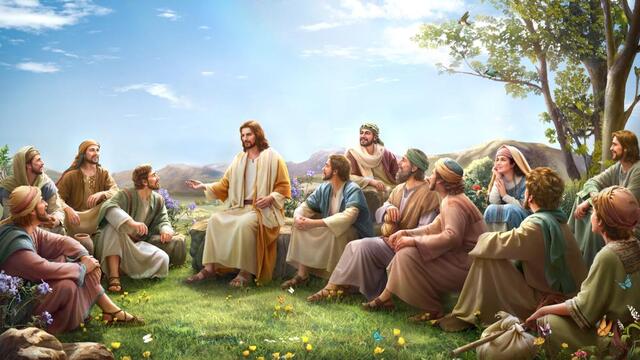What Does the Verse in Revelation About Not Adding Things Refer To?
By Chiheng
The sharp “beep … beep” of a car’s horn sounded in the narrow alley, yanking Xu Min away from her thoughts. Turning to look back, she saw she hadn’t realized she was blocking the car behind her while she was lost in contemplation over something the pastor had said that morning. She rushed to apologize and moved to the side to make room for it to pass, leaving just her diminutive figure. She walked along very slowly as if the winter cold didn’t touch her at all.
Before long she was lost in thought again. Over the last few years, the church had become more and more desolate; the brothers’ and sisters’ faith and love were gradually fading, and she herself felt more and more spiritual darkness and weakness. She had wept and called out to the Lord Jesus so many times, but she could not feel His presence. This was very painful for her. She had also gone around to visit a number of different churches, but that had been fruitless. She was still unable to feel the Lord’s presence. Just as all this was happening, a good friend had sent her a book and told her that the Lord had returned and uttered new words. She was overjoyed and couldn’t wait to seek and investigate this; the more she read, the more she felt that the book was very practical and remedied many errors in people’s faith in God. Her heart brightened after reading it and she gained great spiritual enjoyment. She believed that those words could not possibly be said by a common person, and that they were likely from the Holy Spirit’s enlightenment. But that day, after learning of this, the pastor tried again and again to stop her from looking into it, and said: “It is written: ‘For I testify to every man that hears the words of the prophecy of this book, If any man shall add to these things, God shall add to him the plagues that are written in this book: And if any man shall take away from the words of the book of this prophecy, God shall take away his part out of the book of life, and out of the holy city, and from the things which are written in this book’ (Revelation 22:18–19). It says in the Book of Revelation that nothing can be added or removed from the Scripture. If there are people now bearing witness that the Lord has returned and uttered new words, that would be adding something to the Bible. Thus, any of these claims absolutely cannot be investigated—this would be a betrayal of the Lord.” Hearing this made Xu Min feel a little afraid. She then didn’t know what she should do—her heart felt heavy, and like it was tied up in knots.
After getting home she still couldn’t make heads or tails of it, so she called up her friend and invited her to come over and share fellowship with her. When her friend came to Xu Min’s house, the two chatted about this and that, and then Xu Min brought up her own quandary.
Her friend responded: “Not daring to look into anything having to do with the Lord’s work and words upon His return because the Bible says ‘If any man shall add to these things…’ really is confusing for us. That’s because we don’t have a pure understanding of that passage in Revelation, and by understanding its true meaning your confusion can be resolved. But in order to gain clarity on this issue, we must first know the context of these words in Revelation. In fact, the Book of Revelation was written about 90 years after the Lord. At Patmos Island, after John saw a vision of the last days he recorded it; at the time the New Testament didn’t exist, much less the entire Bible, the Old and New Testament as one book. The New Testament wasn’t put together until 300 years after the Lord. So the book mentioned in Revelation 22:18–19 was not a reference to the complete Bible, but was a reference to that prophecy in the Book of Revelation. And if we take another close look at it, these verses are talking about people adding something to that prophecy, not to the Bible. From these two facts we can know that saying not to add anything to it doesn’t mean that there wouldn’t be any new work or words from God outside of the Bible, but it was telling us that we can’t arbitrarily add or delete anything from the prophecies of the Book of Revelation.”
Hearing this, Xu Min rushed to get her Bible and open it up to Revelation, and she discovered that really was the case. The Revelation clearly says that nothing could be added to the prophecy, but it does not say that nothing could be added to the Bible as a whole. Determining that there could be no further words from God outside of the Bible based on that passage was not at all appropriate. Wow! It was so obvious—why hadn’t she seen it before?
Her friend went on to say: “Plus we need to be clear on the true meaning of these words in Revelation. It is written: ‘If any man shall add to these things….’ We can see that this was a warning for us: Humans cannot arbitrarily add anything to the prophecies. This is because they are things that God Himself will do in the future, so people cannot know how they will actually be fulfilled until God Himself comes to work. If people arbitrarily layer their own ideas over this foundation, that is distorting God’s words and is an offense to God’s disposition—they will suffer God’s punishment. We must know that these words in Revelation were aimed at us, mankind, not at God. God is the Creator and everything is in His hands. He is qualified to do His own work outside the bounds of the prophecies, and this is something that no created being can possibly obstruct, nor can they delimit this at will. For example, the Bible says in Deuteronomy 12:32, ‘What thing soever I command you, observe to do it: you shall not add thereto, nor diminish from it.’ Here, Jehovah God explicitly tells us that people cannot add anything to His commands, but the Lord Jesus’ work and words in the Age of Grace had not been recorded in the scriptures, and they were even entirely different from some requirements of the law. Just like the requirement in the Age of Law of an eye for an eye and a tooth for a tooth, but when the Lord Jesus was working, He said: ‘You have heard that it has been said, An eye for an eye, and a tooth for a tooth: But I say to you, That you resist not evil: but whoever shall smite you on your right cheek, turn to him the other also. And if any man will sue you at the law, and take away your coat, let him have your cloak also’ (Matthew 5:38–40). Plus, Jehovah God told people in the Age of Law to hate their enemies, but in the Age of Grace, this is what the Lord Jesus said: ‘But I say to you, Love your enemies, bless them that curse you, do good to them that hate you, and pray for them which spitefully use you, and persecute you’ (Matthew 5:44). As those who stuck to the Old Testament saw it, a great deal of what the Lord Jesus said was outside the bounds of the law and was an addition to the law, thus they did not follow the Lord. The Pharisees in particular clung to the Old Testament law to condemn the Lord Jesus, committing the monstrous sin of blaspheming the Holy Spirit. Isn’t that great rebellion on the part of humans? God saying in His words that nothing can be added or removed is His requirement for mankind—how could we impose the requirements of God’s words upon God Himself? God is the ruler of all things and His work is done according to His plan. It is not constrained by any man, nor is it limited to the words of the Bible.”
After saying all this, she pulled out her tablet and deftly opened up a webpage. She went on: “This is from a gospel site: ‘The work done by Jesus during the time of the New Testament opened up new work: He did not work according to the work of the Old Testament, nor did He apply the words spoken by Jehovah of the Old Testament. He did His own work, and He did newer work, and work that was higher than the law. Thus, He said: “Think not that I am come to destroy the law, or the prophets: I am not come to destroy, but to fulfill.” Thus, in accordance with what He accomplished, much doctrine was broken with. On the Sabbath when He took the disciples through the grain fields, they picked and ate the heads of grain; He did not keep the Sabbath, and said “the Son of man is Lord even of the sabbath day.” At the time, according to the rules of the Israelites, whosoever didn’t keep the Sabbath would be stoned to death. Jesus, however, neither entered the temple nor kept the Sabbath, and His work had not been done by Jehovah during the time of the Old Testament. Thus, the work done by Jesus exceeded the law of the Old Testament, it was higher than it, and was not in accordance with it.’ It’s clear that God does not adhere to rules. In every age, God does new work and utters new words—He is not held back by the laws and ordinances of the previous age. God acts according to the requirements of His work as well as what we as humans need. He is constantly uttering new words; this is the only way to lift mankind up to a higher plane so that we may fully escape from the forces of Satan and ultimately attain God’s salvation. This is why we cannot think of God’s work and words as limited to what the Bible contains, and we particularly cannot make demands on God based on His demand of human beings not to add or take away anything, or determine that outside of the Bible, there cannot be any new words from God. Wouldn’t you say so?”
Xu Min nodded her head—hearing all this from her friend brought her immeasurable clarity. What was said in the Book of Revelation about not adding or removing anything referred to the fact that humans could not wantonly delete or add to God’s words, but it did not mean that God Himself could not utter more words after that. If people lack a pure understanding of that passage of the scripture, cling to their absurd notions, and then through that delimit the work of God, won’t they likely offend God’s disposition? Realizing that, Xu Min really broke out into a cold sweat—the Pharisees concluded that the Lord Jesus deceived people because they clung to the old law and thought that His words were adding to the law, and she herself narrowly missed making the same mistake that the Pharisees had made.
Her friend went on to say: “Do you remember what it says in John 16:12–13?”
Without hesitation, Xu Min said: “I remember. Isn’t that a passage we’ve often recited? The Lord Jesus said, ‘I have yet many things to say to you, but you cannot bear them now. However, when He, the Spirit of truth, is come, He will guide you into all truth: for He shall not speak of Himself; but whatever He shall hear, that shall He speak: and He will show you things to come’ (John 16:12–13).”
Continuing on, her friend said: “This passage of scripture states very clearly that when God returns in the last days, He will express many more words to water and nourish us so that we may understand and enter into all truths. There are also the prophecies of the Book of Revelation: ‘He that has an ear, let him hear what the Spirit says to the churches; To him that overcomes will I give to eat of the hidden manna, and will give him a white stone, and in the stone a new name written, which no man knows saving he that receives it’ (Revelation 2:17). ‘And I saw in the right hand of Him that sat on the throne a book written within and on the backside, sealed with seven seals. And I saw a strong angel proclaiming with a loud voice, Who is worthy to open the book, and to loose the seals thereof? And no man in heaven, nor in earth, neither under the earth, was able to open the book, neither to look thereon. And I wept much, because no man was found worthy to open and to read the book, neither to look thereon. And one of the elders said to me, Weep not: behold, the Lion of the tribe of Juda, the Root of David, has prevailed to open the book, and to loose the seven seals thereof’ (Revelation 5:1–5). ‘What the Spirit says to the churches’ and ‘the hidden manna’ mentioned here, the scroll with seven seals that is to be opened, and so on and so forth, all prove that when God returns in the last days He will have more words to utter and more work to do; He will unveil all the mysteries that we have never before understood. So, can we really conclude that anything outside of the Bible cannot be God’s words because of the words “If any man shall add to these things…”? It is also written: ‘And there are also many other things which Jesus did, the which, if they should be written every one, I suppose that even the world itself could not contain the books that should be written’ (John 21:25). This verse also tells us that the Lord Jesus said many things and performed many deeds while He was working, and what is recorded in the Bible is limited. Not all of the Lord Jesus’ words and work were recorded. Not even the entirety of the Lord Jesus’ work and words was recorded in the Bible, so wouldn’t us saying that anything outside of the Bible cannot be God’s words be a denial of the Lord’s own words and deeds?”
Hearing this, Xu Min was so excited that she stood up and said: “Oh my, I read the Bible every single day. How could I not have discovered this mystery? I’m gaining more and more clarity through your fellowship, and now I completely understand that the work of God that is recorded in the Bible is limited, that it’s not a complete record of God’s work and words. It’s not even a complete record of the Lord Jesus’ work and words. Considering the fact that the Lord Jesus worked for over three years, what He said in any given day would have been much more than what is now recorded in the Bible. When the Lord returns in the last days, He does new work and utters new words—this is a fact that cannot be denied and it’s very clearly written in the prophecies. Now I know that human beings can never delimit God’s work, and we particularly cannot define God within the scope of the Bible. Particularly when investigating the true way, we really must follow the Holy Spirit’s leadership and guidance, and seek and investigate it with an open heart in order to welcome the Lord. Otherwise, we will be like the Pharisees who opposed God and were ultimately destroyed because they clung to the literal words of the scripture. At a time like that, it’s too late for regrets!”
My friend smiled and nodded: “That’s right. If we want to keep up with the footsteps of the Lamb, we must maintain a heart that hungers and thirsts for righteousness, and a heart of seeking the truth. We cannot be hindered by any of our notions or imaginings—that is the only way to welcome the Lord’s appearance in the last days, be the intelligent virgins, and be raptured up before God’s throne. Just as the Lord Jesus said, ‘Blessed are the poor in spirit: for theirs is the kingdom of heaven. … Blessed are they which do hunger and thirst after righteousness: for they shall be filled. … Blessed are the pure in heart: for they shall see God’ (Matthew 5:3, 6, 8).”
Xu Min vigorously nodded her head: “Yes! Amen!” Her confusion was completely swept away and she felt incredibly joyful. As they continued their fellowship, the sound of their happy, carefree laughter occasionally floated outside …
- 1Why Is It Hard for a Rich Man to Enter God’s Kingdom?
- 2What Is the Meaning of the Parable of the New Cloth and Old Garment?
- 3What Do the Overcomers in the Bible Refer To?
- 4What Does John 3:36 Mean?
- 5What Is the Church of Philadelphia in the Bible?
- 6Are You Really Worshiping the Lord Jesus at Christmas?







